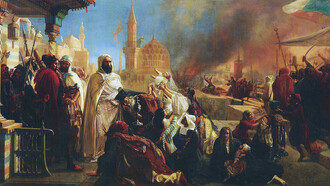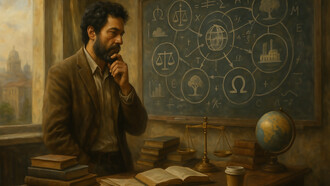July 3, 2025, was a very special day for me. Manny Greer, a friend of many years, died in New York, and there was a part of me that died with him. When the weather would allow it, we used to sit on a bench outside Ground Support, our favorite coffee house in Soho. We were friends with the manager and the employees, who frequently treated us to coffee and pastries.
Manny died a few months after reaching his 100th birthday, having led a varied and successful life. He was born in New York’s Lower East Side, at a time when it was a poor but lively Jewish neighborhood in Manhattan. While a soldier in World War II, he performed a remarkable act of humanity. When he flew over southern Japan as a bombardier, he was in charge of dropping bombs on urban centers. “I just couldn’t do it,” he told me. “I didn’t want to carry on my conscience the death of so many people.” Instead, he dropped the bombs on the countryside, where the casualties were going to be much lower.
After returning from the war, he went to Paris, where for a couple of years he worked at a women’s fashion institute and became fluent in French. When he returned to New York, he worked with his brother as an art dealer at a gallery on the same block as the Museum of Modern Art in New York (MOMA). There, he became friends with some notable artists of our time, such as Fernando Botero, the Colombian painter and sculptor, and Jackson Pollock and Mark Rothko, the American painters, who used to come to the gallery to chat with him.
It was precisely a painting by Botero that led to a crucial event in his life, with long-lasting repercussions. One day, while he was at the gallery, he encountered Jane Greenberg, a young and attractive divorced mother of three. She asked Manny about the painting, and he, being a friend of Botero, was able to give her all the information she wanted.
An initial conversation led to many others, and a few months later, they were married. Suddenly, my friend Manny, who had never been married before, was now the father of three children whom he loved as his own, a love they amply reciprocated.
One day, shortly before Passover, we began discussing the merits of the different brands of matzo, or matzah. This is an unleavened bread that is part of the Jewish cuisine and that is an integral part of the holiday during which chametz (leaven and five grains that, according to Jewish law, are self-leavening) is forbidden.
Although I only learned about matzos when I came to live in New York from Argentina, Manny, coming from a Jewish background, had eaten matzos all his life and was quite addicted to them.
One day, as we were watching life pass by, I suddenly asked Manny, “Hey, Manny, have you ever eaten a toasted matzo?” With a look of horror and disbelief, he said, “If I had eaten what?” “Toasted matzo,” I replied. “Since I started eating matzos, I always toast them and I find that, properly done, they become much tastier and the butter is easier to spread on them.”
While sitting at the coffee house, Manny liked to teach me some Yiddish words, and he found some pleasure in correcting me when I mispronounced them. “You are an absolute meshugener (a crazy or foolish person in Yiddish),” he told me, “You never, never, toast matzos.” “Why?” I said, “I toast my bread. I don’t see why I couldn’t toast my matzo.” “Because you don’t,” he replied, “that’s why. You Argentinians are crazy. That’s the most stupid idea I ever heard…”
His reaction didn’t seem reasonable, so I made a point, just to tease him, of asking every few days if he had eaten a toasted matzo. His reply was always negative.] Until one day he told me, “Tonight, I am going to toast my matzo, so you will stop bothering me. How should I do it?” “Very simply,” I said. “Just put it into the toaster for the shortest time, since they burn very easily, and voilá, you will have your toasted matzo.”
That evening, I was watching a British mystery on TV when the phone rang. “Don’t answer it,” I told my wife. We were about to find out who the murderer was. My wife, who is a compulsive phone answerer, totally ignored me, answered the phone, and passed it on to me, saying, “It’s Manny for you.” As soon as I got on the phone, Manny asked me, “Can you hear it?” Of course I could. With his laughter in the background, I could hear the unmistakable sound of his crunching a toasted matzo.















